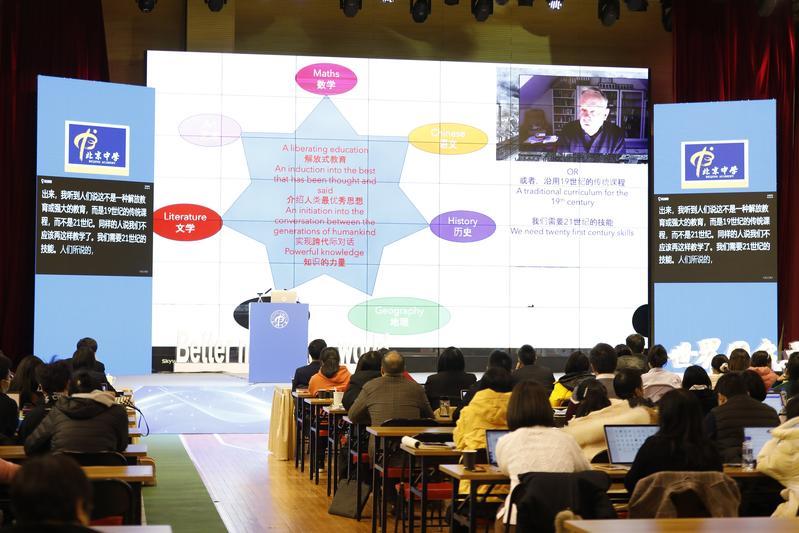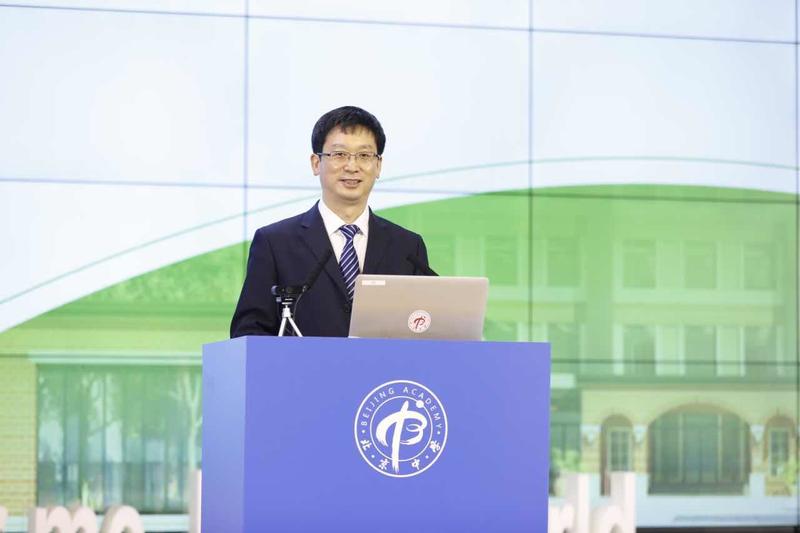Beijing Academy is devoted to following a teaching method that seeks to instill an education in Beijing style and with a Chinese temperament, Du Juan reports.
 The 8th Beijing Academy Seminar under the theme of "designing the ideal future school" is held in Beijing in late December. (PHOTO PROVIDED TO CHINA DAILY)
The 8th Beijing Academy Seminar under the theme of "designing the ideal future school" is held in Beijing in late December. (PHOTO PROVIDED TO CHINA DAILY)
Beijing, China's culture hub with the largest number of top-notch education institutions, has been making increasing efforts to enhance both teaching quality and global vision for its K12 education to better prepare the city's youth to face the uncertainty in the world with more confidence.
As a key driver to synergize international education know-how with the city's education authorities and experts, the 8th Beijing Academy Seminar under the theme of "designing the ideal future school" was held in Beijing in late December.
Our students are respected and loved, because only then can they truly learn to love others and contribute to the world when they are able.
Xia Qingfeng, principal of Beijing Academy
The event pooled together government officials, K12 education practitioners and experts, both online and in person, from China, the United Kingdom, New Zealand, the United States and the Organization for Economic Cooperation and Development to share their views and insights on the building of future schools, innovative talent and quality teaching.
"Education authorities and schools should provide more choices with abundant supplies for students, in order to make sure that they can get enough high-quality resources to further develop their strength," said Li Yi, spokesperson of Beijing Education Commission, when addressing the seminar.
He analyzed Beijing's education policies by presenting detailed explanations and examples showing how the city reallocates school resources and services to cater to the higher quality demands of the students.
The municipal government recently announced it will establish an online platform where all high school teachers can provide courses to all students in the city, which is supposed to shatter the physical borders among schools and help students in remote areas gain access to top-quality educational resources.
Meanwhile, under the guidance of the Ministry of Education, Beijing education authority required all primary and junior high schools to cut the homework burden of their students and provide better after-school services for them between 3 pm and 6 pm.
This is part of a broader nationwide campaign to implement a guideline issued by the general offices of the Communist Party of China Central Committee and the State Council. The guideline, commonly known as "double reduction", aims to reduce homework and after-school tutoring pressure and further cut academic workload for primary and middle school students, in general, making K12 education more student-oriented.
 Xia Qingfeng, principal of Beijing Academy. (PHOTO PROVIDED TO CHINA DAILY)
Xia Qingfeng, principal of Beijing Academy. (PHOTO PROVIDED TO CHINA DAILY)
Beijing Academy, a leading Chaoyang district-based public school where the seminar was held, has been actively implementing and practicing such student-oriented teaching philosophy since its founding in September 2013.
The school offers full K12 courses with an emphasis on K7 to K12, preparing students with the key qualities, merits and competences they need for their pursuit of academic excellence at domestic or overseas universities and, most importantly, for their future lives.
Xia Qingfeng, principal of Beijing Academy, said at the seminar that it's the academy's persistent pursuit of making no social distinctions in teaching, while teaching students in accordance with their aptitude, and the emphasis on the unity of knowledge and action that make the academy a true "home" for students both physically and psychologically.
"We need to keep a balance between ideal and reality, innovation and inheritance, freedom and rules, teaching and learning," he stressed. "We should also increase our power of tolerance, so as not to require the same from different students."
Beijing Academy has created a space where all students can enjoy what they are interested in and good at during their school time, he said. Meanwhile, the school has kept an open attitude toward all resources outside the campus for their across-the-board development.
A reflection of the academy's student-oriented teaching philosophy is the Chinese characters of the school's name inscribed at the entrance to the campus. They are written by several fifth graders of the school. This is something that rarely happens in China, where most schools would rather have their names written by prestigious calligraphers or celebrities.
Beijing Academy was founded with a mission to be a modern top-level school in Beijing style and with a Chinese temperament, as well as the vision and a care for the whole world, according to Xia. Therefore, he has devoted all his effort to helping the school realize this goal.
"Chinese education has developed rapidly over recent decades, with dozens of curriculum improvements. We have already abandoned the teaching method of issuing tons of tests and homework just for a good score," he said. "Even though we need to learn from developed countries, we should also have full confidence in our own education system."
China's K12 education has undergone a sea change in recent years, the stereotyped "duck-stuffing "type of teaching, mostly, no longer represents China's modern education paradigm.
At Beijing Academy, students take learning trips every semester to other places, including Shaanxi and Henan provinces, to experience Chinese history and culture. They spend time participating in plenty of arts and sports clubs at school to further develop their interests.
Meanwhile, teachers at the school prepare the students to be ready for the national college entrance exam, or gaokao, as well as applications for overseas universities.
"Our students are respected and loved, because only then can they truly learn to love others and contribute to the world when they are able," Xia added.
Situated in Beijing's Chaoyang district, where local authorities are channeling more resources to develop the district into Beijing's international "name card", Beijing Academy also plays a pivotal role in bolstering international education exchanges.
Before the COVID-19 pandemic, education experts and scholars from the US, Britain, Canada and Australia visited the school every year to exchange insights and ideas, something that will continue when normalcy returns, Xia said.
According to the school's future blueprint, it plans to accept international students to cater to the needs of expat residents in Beijing by offering high-quality education with Chinese characteristics.
Contact the writer at dujuan@chinadaily.com.cn


